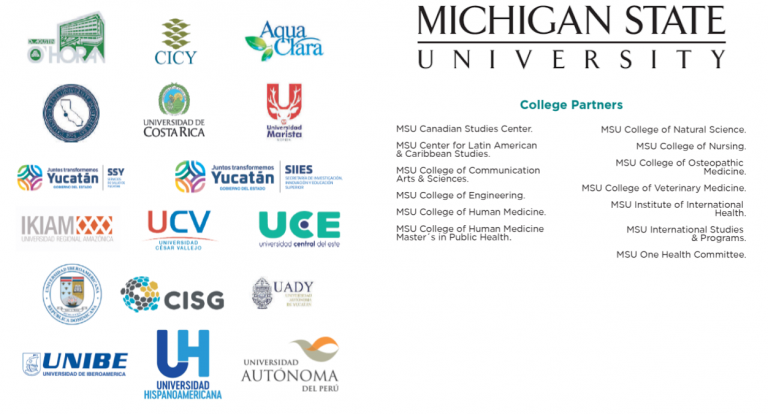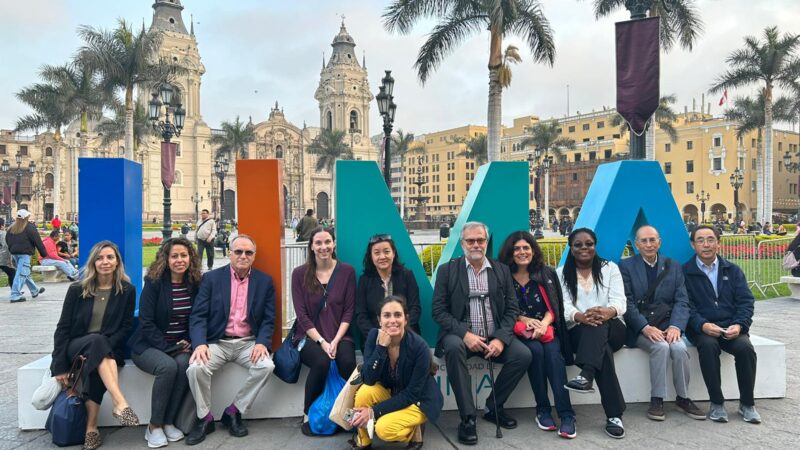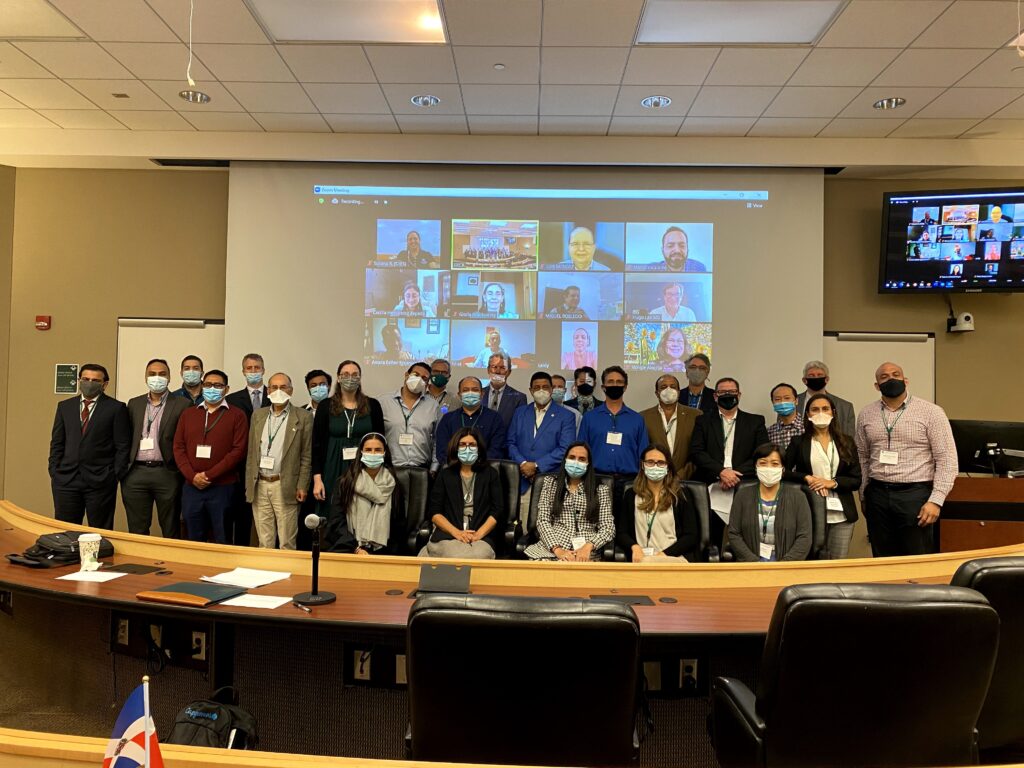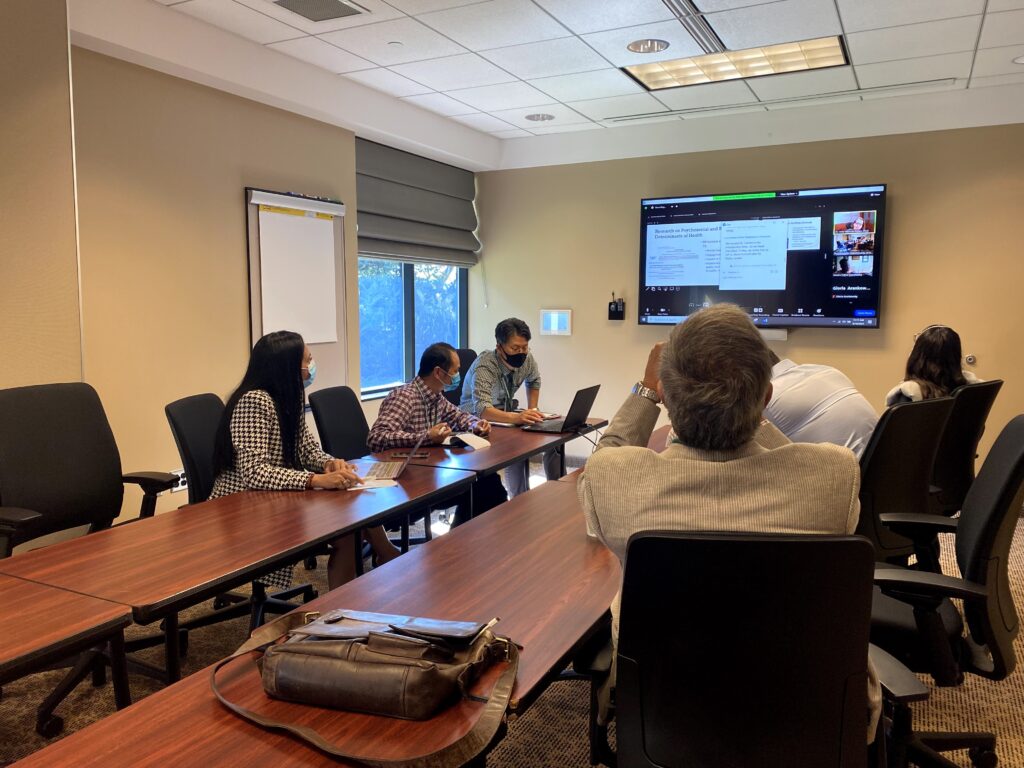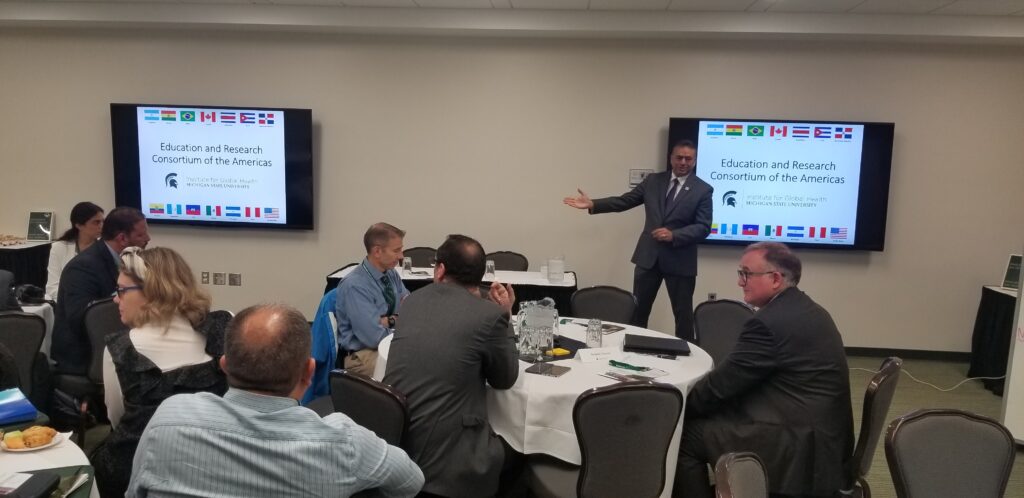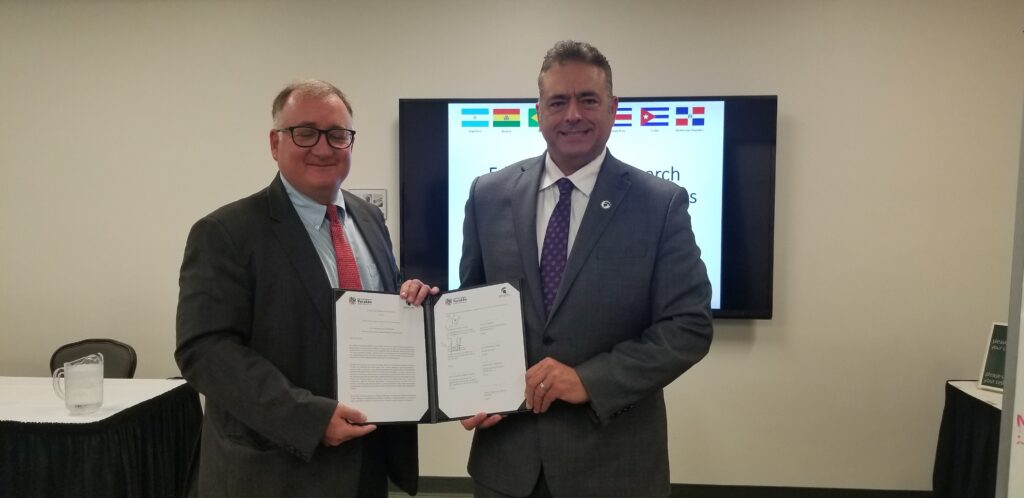Education and Research Consortium of the Americas (ERCA)
Home » Capacity Building » ERCA
Introduction
In September 2019, seven countries from Latin and South America were invited to Michigan State University by the Institute for Global for a three-day research conference, leading to the establishment of four online Virtual Institutes: Psychosocial Determinants of Health, Tropical Medicine/Infectious Diseases, Water Quality/Waste Management and the Ecology Institute.
At the beginning of 2020, the Institute for Global Health (IGH) worked on developing the infrastructure and designating a chair for each of the Institutes. To ensure a sustainable long-term presence, IGH designated Sabrina Vieyra as the Project Coordinator.
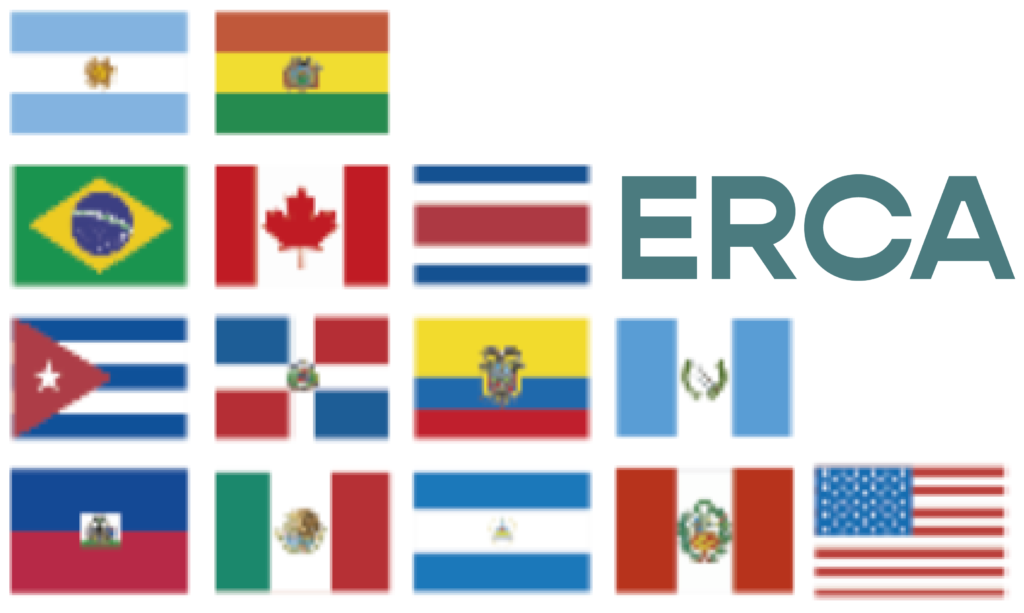
Dr. Robert Paulino, from Universidad Iberoamericana chairs the Infectious Disease/Tropical Medicine Virtual Institute. He is an M.D, a researcher, a specialist in virology, and main researcher for the Institute for Tropical Medicine and Global Health at UNIBE in Dominican Republic.

Dr. Itziar Familiar-Lopez, in the College of Osteopathic Medicine, Department of Psychiatry at MSU, is the chair of the Psychosocial Determinants of Disease. She is an MD from Mexico City with an MPh (National School of Public Health, Spain) and a PhD in Mental Health (Johns Hopkins Bloomberg School of Public Health, USA). Dr. Familiar’s research has focused on global mental health issues, psychological distress among adults in conflict-affected settings, monitoring and evaluation of mental health interventions, and assessment of child development.

Dr. Irene Xagoraraki, Associate Professor of Environmental Engineering in the College of Engineering at MSU, chairs the Water Quality/Waste Management Institute. Her research program focuses on water quality engineering, emphasizing the protection of public health and prevention of waterborne disease. In recent years and amid the pandemic, she has been leading MSU’s efforts on wastewater analysis into preventing the next disease outbreak with over $2.5 million dollars in funds from the Detroit Department of Health.

Dr. David Macfarlane, from the MSU College of Agriculture and Natural Resources, has been leading the Ecology and Human Well-Being Virtual Institute with a focus on forestry, bee keeping and other environmental/ecological issues. Dr. Macfarlane is a Professor of Forest Measurements and Modeling and Director of Undergraduate Studies in the Department of Forestry.

Dr. Ilce Medina-Meza, Assistant Professor, Biosystems and Agricultural Engineering, Health Engineering, at MSU and Dr. Karen Castillo, Director of Programa Interdisciplinario de Educación para la Salud, Escuela de Ciencias de la Salud at Marista University, Merida, Mexico, will be the co-chairs of the newly formed non-communicable diseases virtual institute, expected to kick off in mid 2023.

These virtual online institutes bring together researchers in Latin and South America with Michigan State University faculty to collaborate to solve some of the most vexing problems that confront society today.
Gobierno de Yucatan (SIIES), Universidad Cesar Vallejo, Universidad Autónoma de Yucatan, Universidad Iberoamericana, Universidad Marista, and Armed Forces College of Medicine in Egypt were among the first Consortium bring academics and researchers from their departments together to collaborate on the aforementioned projects.

These virtual online institutes bring together researchers in Latin and South America with Michigan State University faculty to collaborate to solve some of the most vexing problems that confront society today.
Gobierno de Yucatan (SIIES), Universidad Cesar Vallejo, Universidad Autónoma de Yucatan, Universidad Iberoamericana, Universidad Marista, and Armed Forces College of Medicine in Egypt were among the first Consortium bring academics and researchers from their departments together to collaborate on the aforementioned projects.
In the midst of the global pandemic for SARSCOV-19 virus one of the virtual institutes turned its focus to water virology. During the first virtual meeting of the Water Quality Institute on June 25th, 2020, Dr. Xagoraraki presented a path for research to identify COVID-19 and other viruses utilizing wastewater sampling in urban and rural areas. The goal? To predict the next outbreak and prevent the spread and the burden of the healthcare system. After a brief explanation on the needed knowledge, sampling activities and laboratory requirements, researchers from Mexico, Peru and Dominican Republic came on board, offering their experience and assistance to apply the same collection and detection process in their communities. Potential grant applications in collaboration with at least three (3) countries, considering the urgent worldwide need to detect and prevent the spread of such viruses.
During July and August, 2020 additional meetings for the virtual institutes of Psychosocial Determinants of Disease, Ecology and Tropical Medicine/Infectious Disease took place to define the research and education opportunities members would work on.
By the end of 2020, each of the original virtual institutes have developed projects for research and education that would provide the footprint for ongoing work.
In October of 2022, Expanding Research and Education, the first ERCA workshop in Latin America, took place in Lima, Peru, hosted by one of the original ERCA members, Universidad Cesar Vallejo. As a result of the workshop and among many other project outcomes, the members decided that a fifth virtual institute should be added to address complex matters related to non-communicable diseases. Cancer, diabetes, cardiovascular diseases, and nutrition were at the top of the priorities chart for those members that will start working during 2023 activities.
The virtual institutes are framed into the Education and Research Consortium work with the idea of reaching new heights on regional collaboration. This is an exciting project, as the tools it provides will help all the member institutions to develop research focused teams to address complex problems.
2023 is our fourth year, and there is more to come on the right track.
If you would like to know more about how to participate in our virtual institutes, please contact us at igh@msu.edu
Workshops and Conferences
2022
Universidad Cesar Vallejo (UCV) and the Institute for Global Health (IGH) at Michigan State University (MSU) hosted the Education and Research Consortium of the Americas (ERCA) WORKSHOP 2022.
For the past three (3) years, ERCA members had been working together to develop collaborative, multidisciplinary teams that can approach complex health issues within four virtual institutes: Psychosocial Determinants of Disease, Tropical Medicine/Infectious Diseases, Water Quality & Ecology and Human Well-Being. Expanding research and education on these topics and addressing new health matters such as non-communicable diseases are top goals of ERCA consortia members for the upcoming years.
The workshop was hosted on Universidad Cesar Vallejo Los Olivos campus Lima, Peru from October 25th to October 27th, 2022.
The agenda included:
Opening presentations by UCV and MSU
Breakout sessions to explore collaboration in the different virtual institutes
Preparation/Discussion for a Virtual Non-Communicable Diseases Institute
Identifying funding sources for research endeavors
2021
The College of Osteopathic Medicine (COM) and the Institute for Global Health (IGH) at Michigan State University (MSU) hosted the Education and Research Consortium of the Americas (ERCA) Conference in September, 2021.
In 2019, this conference brought together over 35 researchers in the Americas. Six institutions from Latin America and South America, with whom IGH has been partnering with for the past decade, joined this Consortium in a collaborative effort to develop global education, research and capacity building. Since then, ERCA grew to incorporate faculty and researchers from universities in the Dominican Republic, Costa Rica, Ecuador, and Canada. The results of the 2019 annual conference established four online Virtual Institutes: Psychosocial Determinants of Disease, Tropical Medicine/Infectious Diseases, Water Quality & Ecology and Human Well-Being, which has been key in the enhancement of an educational and research regional network, especially through the pandemic. Our goal for this event was to strengthen ongoing research opportunities that each institute has been developing.
The agenda included:
- Opening presentations by IGH and each represented institution
- Discussion of research and education goals
- Breakout sessions to explore collaboration in the different virtual institutes
- Identifying funding sources for research, educational exchange and outreach programs.
- Sharing conclusions and planning future endeavors.
The COVID-19 pandemic created constraints for many of our partner institutions. In 2021, IGH and the College of Osteopathic Medicine, in collaboration with UCV (Universidad Cesar Vallejo), offered one airfare credit for each ERCA institution to be used for the conference.
2019
Latin-American Research and Education Consortium
The Institute for Global Health (IGH) with College of Osteopathic Medicine (COM) at Michigan State University (MSU) hosted the second Latin-American (LATAM) Research and Education Consortium in September, 2019.
The Institute for Global Health’s main objective is to develop collaborative, multidisciplinary teams that can approach complex health issues not only in our community, but worldwide. Addressing local and global factors that impact the optimal health and well-being for humans, animals, and the environment is one of its priorities.
This conference brought together like-minded organizations and specialty researchers to focus on areas—agriculture, veterinary, genetics, natural science, nursing, and apiculture, among others—that compound the one health concept and facilitated discussions on the direction and growth of global health research for the nation and the world in the coming decades.
The expected outcomes from this consortium were be to build the basis for the Virtual Tropical Medicine Institute and identify funding sources between LATAM and US that will help to contribute to the research projects discussed through the workgroups and present a plan for future endeavors.
One Health is defined as the collaborative effort of multiple disciplines working locally, nationally, and globally to attain sustainable optimal health for the ecosystem and that’s what attendants will work throughout the Consortium.
Members
Dr. | Robert Paulino | Universidad Abierta Iberoamericana |
Dr. | Peter Gulick | Michigan State University |
Dr. | Michael Boivin | Michigan State University |
Dr. | Aileen Aldrich | Childrens DeVos Hospital |
Dr. | Kenny Briceno | Michigan State University |
Dr. | Santiago Benites | Universidad Cesar Vallejo |
Dr. | Matilde Jimenez Coello | Hideyo Noguchi Centro de Investigaciones |
Dr. | Antonio Ortega Pacheco | Universidad Autonoma de Yucatan |
Dr. | Pedro Alarcon-Elbal | Universidad Abierta Iberoamericana |
Dr. | Leandro Tapia | Universidad Abierta Iberoamericana |
Dr. | Estefani Sanchez | Universidad Abierta Iberoamericana |
Dr. | Arismendy Benitez | Universidad Abierta Iberoamericana |
Dr. | Jenny Cepeda | Universidad Abierta Iberoamericana |
Ms. | Qing Xia | Michigan State University |
Dr. | Raykenler Yzquierdo Herrera | Universidad Central del Este |
Dr. | Tomas Diaz Valdez | Universidad Central del Este |
Dr. | Leidy Cortezaga Avila | Universidad Central del Este |
Dr. | Alex Napoleon Castaneda Sabolgal | Hospital Victor Lazarte Echegaray, Sociedad Peruana de Enfermedades Infecciosas, Peru |
Dr. | Tamara Jordan | College of Osteopathic Medicine, MSU |
Dr. | Rene Hinojosa | College of Osteopathic Medicine, MSU |
Dr. | Rebecca Malouin | College of Osteopathic Medicine, MSU |
Dr. | Evangelyn Alocilja | College of Engineering |
Dr. | Santiago Benites | Universidad Autonoma de Peru |
Dr. | Matilde Jimenez Coello | Hideyo Noguchi Centro de Investigaciones, Merida, Mexico |
Dr. | Gloria Arankowsky | Hideyo Noguchi Centro de Investigaciones, Merida, Mexico |
Dr. | Sally Venega de Novelo | Hideyo Noguchi Centro de Investigaciones, Merida, Mexico |
Dr. | Arsenio Rosado Franco | Gobierno de Yucatan , Jurisdiccion Sanitaria #1, Subdirector de salud mental |
Dr. | Itziar Familiar Lopez | Michigan State University |
Dr. | Aida Mencia Ripley | Universidad Iberoamericana, Santo Domingo, Dominican Republic |
Dr. | Farha Abbasi | Michigan State University |
Mr. | Jaime Caravaca | Universidad de Costa Rica, San Jose, Costa Rica |
Dr. | Carlos Faerron Guzman | Universidad de Costa Rica, San Jose, Costa Rica |
Dr. | Michael Boivin | Michigan State University |
Dr. | Travis Gordon | Michigan State University |
Dr. | Antonio Ortega Pacheco | Universidad Autonoma de Yucatan |
Prof. | MaryAnne Walker | Michigan State University |
Ms. | Qing Xia | Michigan State University |
Dr. | Amara Ezeamama | Michigan State University |
Dr. | Annirudh Behere | Children Devos |
Mr. | Mauricio Camara Leal | SIIES – Gobierno de Yucatan |
Ms. | Ariadne Morales | SDS- Gobierno de Yucatan |
Dr. | Raul Santos Briones | SSY- Gobierno de Yucatan |
Dr. | Irene Xagoraraki | Michigan State University |
Dr. | Juan Pablo Flores | Hospital Regional de Alta Especialidad, Mexico |
Dr. | Emanuel Torres Horta | Hospital Regional de Alta Especialidad, Mexico |
Dr. | Shane Sergent | Michigan State University |
Dr. | Kenny Briceno | Michigan State University |
Dr. | Santiago Benites | Universidad Cesar Vallejo, Peru |
Dr. | Matilde Jimenez Coello | Hideyo Noguchi Centro de Investigaciones, Mexico |
Dr. | Raykenlen Yzquierdo Herrera | Universidad Central del Este, Dominican Republic |
Dr. | Tomas Diaz Velez | Universidad Central del Este, Dominican Republic |
Dr. | Leidy Cortegaza Avila | Universidad Central del Este, Dominican Republic |
Dr. | Erin Dreelin | Michigan State University |
Dr. | Cuahotemoc Sanchez | Hospital Agustin O Horan, Mexico |
Dr. | Alberto Vargas | Universidad Abierta de Yucatan (UADY), Mexico |
Dr. | Rene Hinojosa | Michigan State University |
Dr. | Jay VandenBirk | Aquaclara Project Manager |
Ms. | Mary Anne Walker | Michigan State University |
Dr. | Travis Gordon | Michigan State University |
Ms. | Qing Xia | Michigan State University |
Dr. | Ricardo Bello | SIIDETEY, Mexico |
Dr. | Cecilia Hernandez | Centro de Investigacion Cientifica de Yucatan (CICY), Mexico |
Dr. | Jiaguo Qi | Michigan State University |
Dr. | Miguel Robledo | IKIAM |
Dr. | Luis Quishpe | IKIAM |
Dr. | Luis Mendez Trujeque | Marista University |
Dr. | Hugo Laviada | Marista University |
Dr. | Marco Escalante | Marista University |
Dr. | Arpon Shahed | Michigan State University |
Dr. | David Macfarlane | Michigan State University |
Dr. | Travis Gordon | Michigan State University |
Dr. | David Mota -Sanchez | Michigan State University |
Dr. | Aida Mencia Ripley | Universidad Iberoamericana, Santo Domingo, Dominican Republic |
Dr. | Carlos Faerron Guzman | Universidad de Costa Rica, San Jose, Costa Rica |
Dr. | Matilde Jimenez Coello | Hideyo Noguchi Centro de Investigaciones, Merida, Mexico |
Dr. | Antonio Ortega-Pacheco | Universidad Autonoma de Yucatan (UADY), Head of VET MED |
Dr. | Gloria Arankowsky | Hideyo Noguchi Centro de Investigaciones, Merida, Mexico |
Dr. | Sally Vanega de Novelo | Hideyo Noguchi Centro de Investigaciones, Merida, Mexico |
Dr. | Jorge Herrera-Silveira | Centro de Investigacion y Estudios Avanzados del IPN, Merida, Mexico |
Dr. | Javier Quezada Euan | Universidad Autonoma de Yucatan (UADY) |
Ms. | Qing Xia | Michigan State University |
Dr. | John Banks | CSU- Monterey Bay |
Mr. | Sung Soo Chung | Michigan State University |
Mr. | Mauricio Camara Leal | SIIES- Yucatan Government |
Mr. | Gerardo Vela | SIIES- Yucatan Government |
Ms. | Sayda Rodriguez | SDS- Yucatan Government |
Dr. | Susana Ramirez | SIIES- Yucatan Government |
Partners
